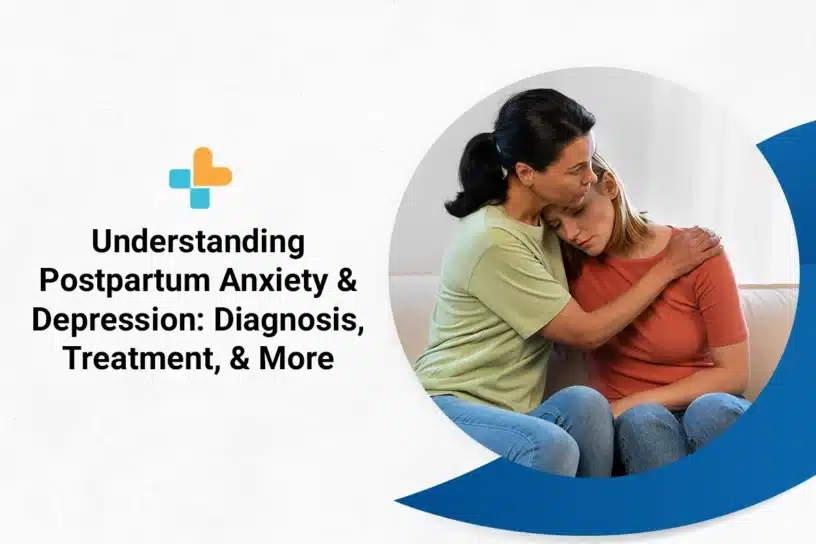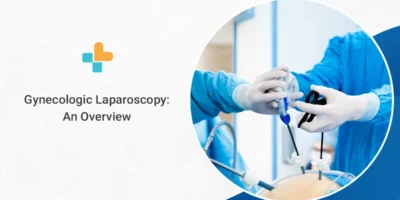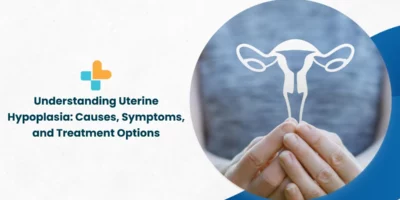The transition to motherhood isn’t always smooth. The postpartum period can be challenging, marked by sleep deprivation and emotional turbulence. Mild depression or ‘baby blues’ is common during this time, but sometimes, it adversely affects a mother’s mental health, hindering her ability to fend for herself and the newborn, leading to postpartum anxiety and depression.
That said, this blog will examine the impact of postpartum depression and anxiety, the contributing factors, and treatment options to support a mother’s well-being.
Postpartum Depression and Anxiety
Postpartum anxiety and postpartum depression (together called postpartum syndrome) are mental health conditions that occur after childbirth.
They may be caused by a combination of physical and emotional factors, including hormonal changes, lack of sleep, stress, and adjusting to the demands of caring for a newborn.
Postpartum psychiatric disorders can be divided into three categories:
- Postpartum blues
- Postpartum psychosis
- Postpartum depression
After childbirth, a mother can experience varied emotions ranging from joy and pleasure to sadness and crying bouts. These feelings of emotional distress are called ‘baby blues’ or postpartum blues, and they tend to decrease over the first couple of weeks after delivery.
Postpartum anxiety and depression, on the other hand, are severe forms of mood disorders that are characterized by feelings of hopelessness, constant anxiety, and guilt that persist for more than two weeks. These emotions are excessive and uncontrollable and interfere with maternal brain response to hamper their ability to care for themselves and the baby.
Symptoms of Postpartum Anxiety
Many signs of postpartum depression overlap with postpartum anxiety, and women with postpartum depression often experience postpartum anxiety as well.
Postpartum anxiety has physical, emotional, and behavioural symptoms.
Physical Symptoms
- Sleeplessness or disrupted sleep
- Increased heart rate or palpitations
- Nausea and trembling
- Breathlessness
- Loss of appetite
Emotional Symptoms
- Feelings of sadness, hopelessness, or emptiness
- Anxiety or panic attacks
- Mood swings or irritability
- Feelings of guilt or worthlessness
- Obsessive irrational fears
Physical Symptoms
- Loss of interest in activities once enjoyed
- Lack of energy or motivation
- Difficulty concentrating or making decisions
- Repeatedly checking things (OCD)
Prevalence of Postpartum Depression and Anxiety
The global prevalence of postpartum depression has been estimated as 100?150 per 1000 births. According to a recently published report by the World Health Organization, about 22% of Indian mothers suffer from postpartum depression (PPD).
Postpartum depression most commonly occurs within six weeks after childbirth. It occurs more commonly in adolescent females, mothers who deliver premature infants, and women living in urban areas.
Diagnosis of Postpartum Anxiety
Unfortunately, there isn’t a clear diagnostic tool for postpartum anxiety. If a new mother is showing or experiencing anxiety symptoms, then medical care is essential.
Doctors may use screening tools such as Edinburgh Postnatal Depression Scale (postpartum depression questionnaire). They should advise mothers that there’s absolutely no shame in filling out this form with honest answers.
An honest conversation about your anxiety is often the best tool doctors have to diagnose and treat postpartum anxiety.
Causes of Postpartum Anxiety
There are several risk factors associated with postpartum anxiety, such as:
- History of anxiety or depression: Previously diagnosed mental health issues or a family history of these conditions may trigger postpartum anxiety.
- Lack of support: Women lacking support from their partners, family, or friends are at greater risk for postpartum anxiety.
- Complicated pregnancy and birthing: Previous pregnancy loss and traumatic birth experiences may develop postpartum anxiety.
- History of abuse or trauma: Women who have a history of abuse or trauma may develop postpartum depression or anxiety.
- Baby with health conditions: Mothers bearing a child with health complications or delivering a preterm baby may experience postpartum anxiety due to increased medical needs.
Treatment for Postpartum Anxiety
Your healthcare provider may recommend treatment based on the severity of symptoms. If postpartum anxiety is affecting your daily life and relationship with the baby, the following treatments may be helpful.
1. Therapy
Therapies such as cognitive-behavioural therapy (CBT) can help identify negative thoughts and adopt healthier thinking patterns and habits.
Other types of therapy, such as interpersonal therapy (IPT) or psychodynamic therapy, may also be helpful depending on individual needs.
2. Medication
Antidepressants, particularly selective serotonin reuptake inhibitors (SSRIs), are often used to treat postpartum anxiety. They work by increasing serotonin (happy hormone) levels in the brain.
Other medications like tricyclic antidepressants (TCAs), monoamine oxidase inhibitors (MAOIs), and dopamine reuptake inhibitors (NDRIs) may also be used in treatment.
3. Lifestyle and Self-Care
The following lifestyle and self-care tips may also help in resolving postpartum anxiety issues:
- Seek help from family and friends or hire help for chores or babysitting.
- Regular physical activity and a healthy diet are helpful.
- Practising yoga, deep breathing, and meditation can help with relaxation.
- Take care of yourself by getting enough sleep.
- Cuddle your baby (a lot) as it releases oxytocin to lower anxiety levels.
- Join support groups where you can share your feelings with similar people.
Taking Care of Postpartum Anxiety
With the right treatment and support, depression after pregnancy can be effectively managed, allowing women to enjoy their new role as a mother. It’s important for mothers with postpartum anxiety to seek help regardless of risk factors.
At Ayu Health, we’re committed to providing the best mental health professionals and resources to help individuals affected by mental health conditions, including postpartum anxiety disorder.
If you need additional information or would like to speak with a professional, feel free to contact us right away at +91 636-610-0800 or book an appointment on our website.
Our Hospital Locations
Gynaecology Surgery Hospitals in Chandigarh | Gynaecology Surgery Hospitals in Bangalore | Gynaecology Surgery Hospitals in Jaipur | Gynaecology Surgery Hospitals in NCR | Gynaecology Surgery Hospitals in Hyderabad
Our Doctors
Gynaecology Surgery Doctors in Chandigarh | Gynaecology Surgery Doctors in Bangalore | Gynaecology Surgery Doctors in Jaipur | Gynaecology Surgery Doctors in NCR | Gynaecology Surgery Doctors in Hyderabad
About the Author

Dr. S. Goel
Dr. S. Goel is a renowned Internal Medicine Specialist currently practicing at Ayu Health, Bangalore. He is a Specialist in Internal Medicine, Diabetes HTN, Paediatric Care, and Family Medicine.




